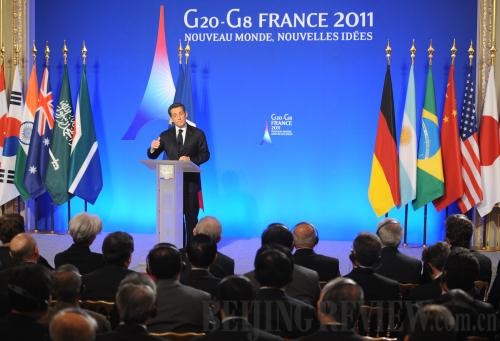|
 |
|
PRESIDENTIAL REMARKS: French President Nicolas Sarkozy gives a keynote speech at the Meeting of G20 Finance Ministers and Central Bank Governors in Paris on February 18 (XINHUA/AFP) |

Finance ministers and central bank governors from the Group of 20 (G20) major economies concluded their two-day meeting with a major consensus on February 19, as compromises were reached after tense debates in Paris. As the first meeting of G20 finance ministers and central bank governors under the French presidency of the organization, France, along with the other G20 members, attached great importance to the event.
A positive step
G20 representatives identified five major topics for the meeting: setting indicators to monitor global economic imbalances; reforming the international monetary system and ensuring financial stability; reducing the volatility of raw material prices; establishing an effective financial regulatory system; and helping improve infrastructure in developing countries and raise funds for them to cope with climate change.
These ambitious topics will be discussed at G20 events throughout the year. Meanwhile, countries will try to reach compromises to substantially enhance the role of the G20 in the global economy.
Among these topics, measuring global economic imbalances was a main point of contention. It was the focus of attention of both the United States and Europe, despite the two's big divergence on how to achieve balance.
On the surface, global economic imbalances remain the most serious problem of the global economy. Countries hold different opinions on the root causes of the imbalances. Developed countries tend to believe the imbalances are caused by emerging economies' undervalued exchange rates, while emerging countries, such as China, think developed countries' irresponsible fiscal and monetary policies are the prime reason for the global financial crisis and current economic difficulties.
But more fundamentally, the various problems in the current global economy result from defects in the international monetary system—especially the dominance of the U.S. dollar. The dollar's excessive liquidity has caused global inflation, a rise in international food prices, and an increased risk that emerging economies will be hit by hot money.
France has always underlined the importance of reforming the international monetary system. The five topics established under the French presidency showed the desire and determination of the G20 to stabilize the world economy and eliminate the many disadvantages of the current systems. As they address these topics, G20 members will contribute greatly to an improved world economy.
During the meeting in Paris, G20 members reached an agreement on measuring global economic imbalances. The agreement marks a positive step toward bridging differences among them. A compromise as it is, it fairly reflects the nature of global economic imbalances.
It defined debts, deficits and private savings as internal indicators, and trade balance and net investment income flows as external indicators. The most controversial factor—foreign exchange reserves—was excluded from the indicators.
This agreement helped to change the image of the G20 as a "talking shop." It paved the way for more consensus and agreements in 2011. In the meantime, it raised the world's expectations for the G20's upcoming meetings this year.
| 